David Dubrow's Blog, page 13
June 11, 2018
Where Have I Been Part One
I haven’t been online so much of late because I fell ill, got worse, and spent eight days in the hospital receiving IV antibiotics. My recovery is slower than I’d like, but I’m glad to be back home. At the time of this writing, I can’t walk well and have to spend most of my time reclining, which is pretty much hell for me.
Like I like to say, it sucks that it happened, but it’d suck more if I didn’t learn anything from it. Hopefully you won’t make the same mistakes I did if you find yourself in a similar situation. If nothing else, it’s nice to be an example for wiser people not to follow.
One last bit of preface: I am amazingly lucky to have fallen ill during the 21st century in an American hospital. All of my healthcare providers have been professional, efficient, and kind, and have taken excellent care of me. Any complaints I have are minor, at best.
—
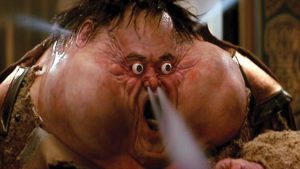 A couple of weeks ago I started to feel sick: sore throat, tired, headache. I figured it was a cold coming on until, a day or two later, my left leg started hurting. A lot. Weird. It hurt so much that I couldn’t walk on it: only lurch. Couldn’t sleep, couldn’t eat. So I went to the local urgent care medical center, and after less than a one minute assessment of my leg the physician’s assistant declared that I had shingles. I’m younger than the average age for it. She sent me home with an anti-viral drug, an antibiotic, and instructions to go to the hospital if things didn’t get any better by Friday.
A couple of weeks ago I started to feel sick: sore throat, tired, headache. I figured it was a cold coming on until, a day or two later, my left leg started hurting. A lot. Weird. It hurt so much that I couldn’t walk on it: only lurch. Couldn’t sleep, couldn’t eat. So I went to the local urgent care medical center, and after less than a one minute assessment of my leg the physician’s assistant declared that I had shingles. I’m younger than the average age for it. She sent me home with an anti-viral drug, an antibiotic, and instructions to go to the hospital if things didn’t get any better by Friday.
Things got worse. The pain increased. A day later my foot swelled to grotesque proportions. Do you remember in Big Trouble in Little China when Thunder got so angry he swelled up and exploded? It looked a bit like that. I should’ve gone to the hospital right there and then, but I blindly trusted the physician’s diagnosis and advice. That was a mistake. Always question everything. Even doctors. Even diagnoses. When conditions change that you can independently verify, like your foot and leg swelling horribly, go get that second opinion. So days passed in agony and blind trust, and I went to the hospital on Friday, days later than I should’ve.
They put me in a wheelchair because I couldn’t walk, wheeled me into the emergency room, and set me up on a gurney in a hospital gown. This is when I began to get scared. I’d been to the hospital before: a couple of times as a kid, and a few times as an adult when my son had to get stitches in his face for various booboos. I’d been fortunate. Not anymore. What was going on? Thank God my wife was there. She helped.
They drew blood, did tests, and told me I’d have to be admitted. Some kind of infection in my leg. Nobody could point to what the infection was, exactly. Maybe I’d scratched a bug bite on my calf. Maybe our new cat scratched me and I didn’t notice. Maybe Extraterrestrial Biological Entities stuck a needle in my leg instead of probing my anus. We never found out what had infected me. But it wasn’t good. And it wasn’t shingles. Red lines were traveling up my thigh toward my heart. Hours later I lay in a private room (luckily) with an IV in the back of my hand, pumping antibiotics into my bloodstream. I’d stay like that for eight days straight.







Where Have I Been Part 1
I haven’t been online so much of late because I fell ill, got worse, and spent eight days in the hospital receiving IV antibiotics. My recovery is slower than I’d like, but I’m glad to be back home. At the time of this writing, I can’t walk well and have to spend most of my time reclining, which is pretty much hell for me.
Like I like to say, it sucks that it happened, but it’d suck more if I didn’t learn anything from it. Hopefully you won’t make the same mistakes I did if you find yourself in a similar situation. If nothing else, it’s nice to be an example for wiser people not to follow.
One last bit of preface: I am amazingly lucky to have fallen ill during the 21st century in an American hospital. All of my healthcare providers have been professional, efficient, and kind, and have taken excellent care of me. Any complaints I have are minor, at best.
—
 A couple of weeks ago I started to feel sick: sore throat, tired, headache. I figured it was a cold coming on until, a day or two later, my left leg started hurting. A lot. Weird. It hurt so much that I couldn’t walk on it: only lurch. Couldn’t sleep, couldn’t eat. So I went to the local urgent care medical center, and after less than a one minute assessment of my leg the physician’s assistant declared that I had shingles. I’m younger than the average age for it. She sent me home with an anti-viral drug, an antibiotic, and instructions to go to the hospital if things didn’t get any better by Friday.
A couple of weeks ago I started to feel sick: sore throat, tired, headache. I figured it was a cold coming on until, a day or two later, my left leg started hurting. A lot. Weird. It hurt so much that I couldn’t walk on it: only lurch. Couldn’t sleep, couldn’t eat. So I went to the local urgent care medical center, and after less than a one minute assessment of my leg the physician’s assistant declared that I had shingles. I’m younger than the average age for it. She sent me home with an anti-viral drug, an antibiotic, and instructions to go to the hospital if things didn’t get any better by Friday.
Things got worse. The pain increased. A day later my foot swelled to grotesque proportions. Do you remember in Big Trouble in Little China when Thunder got so angry he swelled up and exploded? It looked a bit like that. I should’ve gone to the hospital right there and then, but I blindly trusted the physician’s diagnosis and advice. That was a mistake. Always question everything. Even doctors. Even diagnoses. When conditions change that you can independently verify, like your foot and leg swelling horribly, go get that second opinion. So days passed in agony and blind trust, and I went to the hospital on Friday, days later than I should’ve.
They put me in a wheelchair because I couldn’t walk, wheeled me into the emergency room, and set me up on a gurney in a hospital gown. This is when I began to get scared. I’d been to the hospital before: a couple of times as a kid, and a few times as an adult when my son had to get stitches in his face for various booboos. I’d been fortunate. Not anymore. What was going on? Thank God my wife was there. She helped.
They drew blood, did tests, and told me I’d have to be admitted. Some kind of infection in my leg. Nobody could point to what the infection was, exactly. Maybe I’d scratched a bug bite on my calf. Maybe our new cat scratched me and I didn’t notice. Maybe Extraterrestrial Biological Entities stuck a needle in my leg instead of probing my anus. We never found out what had infected me. But it wasn’t good. And it wasn’t shingles. Red lines were traveling up my thigh toward my heart. Hours later I lay in a private room (luckily) with an IV in the back of my hand, pumping antibiotics into my bloodstream. I’d stay like that for eight days straight.







June 2, 2018
Caesure
May 25, 2018
Book Review: Year’s Best Hardcore Horror Volume 3
I’ve read Year’s Best Hardcore Horror Volumes 1 and 2, and in reviewing each one, I alluded to the difficulty of defining “hardcore” in the context of horror. What does it mean? Year’s Best Hardcore Horror Volume 3 has horror in it, and some of the stories are kind of horrible, but is it hardcore?
More to the point, is it hardcore enough for you?
Whether it is or not, a number of the stories don’t tell a story as much as they spray descriptive passages of grotesquerie onto the page. Other tales make more sense to the author, no doubt, than the reader; perhaps your humble reviewer is just too stupid to get them. I (almost) always hold that possibility out.
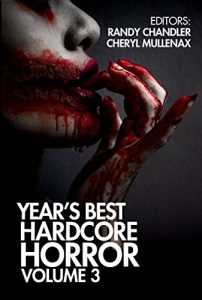 With that in mind, I didn’t get Annie Neugebauer’s So Sings the Siren. I gather it meant something deep, as it started with a Kafka quote, but I lacked the wit to grasp it. The reader can comfortably accuse me of sexism and hence disregard all future opinions by my addition of The Better Part of Drowning by Octavia Cade to the less-comprehensible pile. The Watcher by Douglas Ford wasn’t as much a story as a strangled, tedious narrative focusing on racism and a sick, PTSD-suffering veteran (military vets aren’t part of a protected class like other minorities, so they make good antagonists).
With that in mind, I didn’t get Annie Neugebauer’s So Sings the Siren. I gather it meant something deep, as it started with a Kafka quote, but I lacked the wit to grasp it. The reader can comfortably accuse me of sexism and hence disregard all future opinions by my addition of The Better Part of Drowning by Octavia Cade to the less-comprehensible pile. The Watcher by Douglas Ford wasn’t as much a story as a strangled, tedious narrative focusing on racism and a sick, PTSD-suffering veteran (military vets aren’t part of a protected class like other minorities, so they make good antagonists).
In the imagery over plot pile, Tim Curran’s Scratching from the Outer Darkness goes to the Cthulhupocalypse, which is always welcome; unfortunately, there’s quite a lot of unnecessary description that drags down the narrative. Nathan Ballingrud’s The Maw posited a different kind of apocalypse, but it ladled on the imagery in big, indigestible dollops to cover a familiar story. Brian Hodge’s West of Matamoros, North of Hell ended up being extremely top-heavy without a satisfying conclusion, though it sure was hard-core enough. For me.
Ryan Harding’s Junk was entertainingly disgusting; I liked how he got into the head of an unlikable protagonist. The Cenacle by Robert Levy was very, very long and I lost interest in the last quarter. Luciano Marano’s Burnt did an admirable job of making me squirm. Fans of Matt Shaw’s brand of horror fiction will enjoy Letter from Hell, which is the best thing I can say about it. Readers who enjoy stories of priests who are less priestly than, say, Charlie Sheen will dig R. Perez de Pereda’s Bernadette. Adramelech by Sean Patrick Hazlett was a decent story told in Lovecraftian style sans tentacles. Tree Huggers by Nathan Robinson was a fun sci-fi horror tale that achieves what it sets out to do. The Social Justice crowd will grow warm and tingly over Daniel Marc Chant’s Ultra. Normal people will roll their eyes.
Tim Waggoner’s Til Death is one of my favorites. Holy cow, is it horrific and disturbing. Glenn Gray’s Break had me skipping breakfast that day. Adam Howe’s Foreign Bodies was both hysterically funny and disgusting, which he’s pretty much cornered the market on. The Dogs by Scott Smith is one of those rare stories you will find hard to forget days after you read it. Which is kind of a problem, because it’s pretty damned horrific.
The tremendous highs outweigh the mild lows in this third volume of the Year’s Best Hardcore Horror series, so I’m happy to recommend it to horror fans. Give it a look and let me know what you think.







May 21, 2018
Book Review: Earth Abides
 I still read books, even if I no longer review them for the now-defunct site The Slaughtered Bird. A recent read was George R. Stewart’s novel Earth Abides. Written in 1949, it describes a post-apocalyptic scenario in which graduate student Isherwood Williams (Ish) is bitten by a rattlesnake near a remote cabin, falls ill, and recovers to find that the world’s population has been all but eliminated by a plague of some sort.
I still read books, even if I no longer review them for the now-defunct site The Slaughtered Bird. A recent read was George R. Stewart’s novel Earth Abides. Written in 1949, it describes a post-apocalyptic scenario in which graduate student Isherwood Williams (Ish) is bitten by a rattlesnake near a remote cabin, falls ill, and recovers to find that the world’s population has been all but eliminated by a plague of some sort.
Ish wanders the country to see the devastation, then returns home and meets a few other survivors, who become neighbors. It isn’t long before he starts a family, and events proceed from there.
Post-apocalyptic fiction has changed dramatically since Earth Abides; in today’s tales, the focus is generally on survival in the face of outside threats: looters, aliens, zombies, etc. Once immediate survival concerns are addressed, the characters typically attempt to rebuild civilization as it once was, with electricity, running water, a government, etc.
Not so here. Earth Abides is terribly bleak. The survivors become scavengers feeding off the corpse of the industrialized society they squat upon. No one is capable of building anything lasting, or even thinking far enough in the future to identify something as important as alternative water sources. As the protagonist, Ish suffers from a terrible lack of leadership qualities, a problem he recognizes in himself and simply cannot seem to alter in any way. He’s the de facto leader of his tiny community only because there’s no one else with the intelligence, gumption, or inclination to take charge.
The issue of intelligence being an innate, immutable thing is a major theme of the novel: you’re either born smart or you’re born stupid. Ish, being a graduate student, is apparently the smartest person alive, and everyone else is, quite literally, too dumb to learn anything except the most basic survival skills. He even judges his own children to be mentally deficient; all except one, his favorite: a boy named Joey. What makes this interesting is that Ish sees himself as highly intelligent, but is also aware that he lacks the knowledge that would enable him to rebuild civilization himself. He can’t build a house, repair a car, fix the plumbing, or cut out an appendix. What he can do is philosophize and feel superior to the other survivors. In this, I can’t help but think that the author is either satirizing his own academic colleagues as worthless elitists, or putting himself wholly into the character of Ish and exposing his own elitism. Ish knows everything except what he needs to know, and that presents a problem for himself and his Tribe.
Today’s sensitive readers may flap their hands at the author’s treatment of black people in the novel, despite that Ish marries one and the black people, as negatively as they’re portrayed, at least can farm and take care of animals and do all the things necessary to build a proper community. I’d rather live with them.
Earth Abides shows a decidedly pessimistic post-WWII view of humanity, society, and culture, and while it’s not as unrelievedly dark and distressing as Cormac McCarthy’s The Road, it’s got more than its fair share of hopelessness.







May 14, 2018
New Interview
 Paul Hair, one of the co-authors of Appalling Stories, interviewed me at The Loftus Party:
Paul Hair, one of the co-authors of Appalling Stories, interviewed me at The Loftus Party:
“By fall of 2018, Obsidian Point will publish the third and last book in my Armageddon series of novels: The Holy Warrior and the Last Angel,” Dave said when I asked him about the trilogy. “This book wraps up an epic tale of angels, demons, psychics, holy relics, occultism, and faith in the face of a Biblical apocalypse.”
And it isn’t like a lot of what you find today. “It goes old-school in the vein of The Exorcist and The Omen, where there’s an objective good and an objective evil, and where people of faith aren’t treated with eye-rolling contempt the way they’re typically portrayed in religious-themed fiction,” Dave said.
Read the whole thing at the link.







May 8, 2018
Book Review: Bad Juju
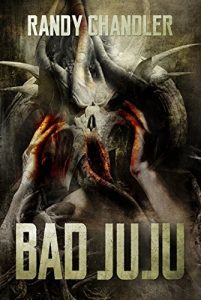 Randy Chandler’s Bad Juju is that rare horror novel that does everything it’s supposed to: it entertains, it shocks, it horrifies, it keeps you reading. The only unfortunate thing is that it invites comparison to Stephen King’s Needful Things in that it involves a small town being menaced by a sinister supernatural force. Comparing the two is a grave error, however. King, in both his fiction and non-fiction, has obvious, seething contempt for normal Americans, while Chandler does not, and it shows in how he invites us to care about all the characters, even the evil ones.
Randy Chandler’s Bad Juju is that rare horror novel that does everything it’s supposed to: it entertains, it shocks, it horrifies, it keeps you reading. The only unfortunate thing is that it invites comparison to Stephen King’s Needful Things in that it involves a small town being menaced by a sinister supernatural force. Comparing the two is a grave error, however. King, in both his fiction and non-fiction, has obvious, seething contempt for normal Americans, while Chandler does not, and it shows in how he invites us to care about all the characters, even the evil ones.
That’s where Bad Juju shines brightest: the characters. What’s a small town like Vinewood, Georgia without the people who live in it? Sure, they’ve got names like Skeeter Partain and Corny Weehunt and Joe Rob Campbell, but they’re real and human and when terrible things start happening to them, you sympathize. Even when Chandler resorts to tropes like the widowed former sheriff character, he twists them around: the sheriff’s dead wife maybe wasn’t the nicest lady around. The ancient black preacher might not know as much about spiritual evil as he thinks. The mentally retarded guy’s no saint. These people share our flaws.
The story’s stranger elements don’t make themselves known immediately, and when they do, they become another layer of conflict in a town that’s already got some disturbing things seething under the surface: namely the Porch family, as mean a clan of townies as you’ll find, and twice as dangerous. Once Skeeter and Joe Rob wind up clashing with the menacing Odell Porch, the stage is set for terror, violence, and revenge.
Chandler eschews political correctness throughout the narrative; it’s refreshing to see people talk and act like real people instead of behaving like social justice boxes to be checked. The violence is ugly and pointless at times, which works. The writing is clear, unpretentious, and gruesomely descriptive. What more could you ask for in a horror novel?
Like I said in my review of Chandler’s short story anthology Devils, Death & Dark Wonders, why isn’t Randy Chandler a household horror name? In an overstuffed field of horror novels that you often have to force yourself to finish, Bad Juju is a breath of fresh (if occasionally fetid) air. Summer’s right around the corner: this book’s your beach read.







May 7, 2018
Housekeeping 5/7/2018
In some truly terrible news, the horror site The Slaughtered Bird is closing its doors:
It’s with a heavy heart, and immediate effect, we announce The Slaughtered Bird website will no longer be able to publish reviews, interviews, or press releases to help promote indie projects.
Over the last few months work commitments and other circumstances have meant there’s less and less time to spend updating everything. Plus, hosting costs are set to go up very soon, which was the final nail in the coffin.
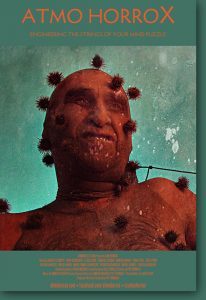
I enjoyed my time writing for The Slaughtered Bird immensely. Chris Barnes, the site’s proprietor, was always professional, kind, and committed to producing quality content. I stopped writing for free outside of my author site for some time, but I stayed on board The Bird because it was a great place, full of good people. It’s possible that I’ll collate the pieces I wrote for The Bird and put them somewhere for posterity; in addition to the many, many horrible films I’ve watched, I did find some of my favorite movies of all time through the site.
—
Atmo Horrox, my favorite movie of 2016, is finally coming to a streaming service near you! Check out the official movie site for details. Pick your adjective: weird, bizarre, trippy, strange, what-have-you, but it’s a film you really ought to see.







May 1, 2018
Appalling Stories 2: Call for Submissions
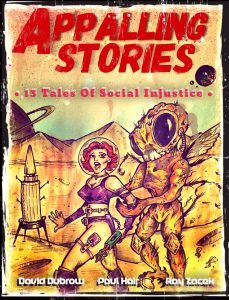 That’s right, shoppers: Obsidian Point is putting together the second volume in the Appalling Stories series, and you can be a part of it!
That’s right, shoppers: Obsidian Point is putting together the second volume in the Appalling Stories series, and you can be a part of it!
Do you have a story, or at least the idea of a story that you don’t think the Social Justice Warrior-led publishing industry would want to touch with a ten-foot pole? Do your eyes roll into the back of your skull at the mention of terms like “representation,” “white privilege,” “cultural appropriation,” and “microaggression”? Do you have a ripped-from-the-headlines piece of short fiction that’s just aching to be told?
Now’s your chance to be part of something amazing. Write a non-PC tale for Appalling Stories 2!
Details can be found right here at the link.







April 30, 2018
Creators Unite Issue #3 Is Live!
The third issue of Creators Unite magazine is live. This is the Troma Issue, focusing on the life and work of Lloyd Kaufman, the owner of Troma Entertainment. Around since the 1980’s, Troma is responsible for movies like The Toxic Avenger, Poultrygeist, Tromeo and Juliet, and other such low-budget indie horror films.
I’m particularly proud of this issue, as I had a fairly active hand in the content. Along with Emilie Flory, I conducted the interview with Lloyd on page 47, under the pseudonym Henri Maillard I wrote the story Avenging Spirit in the Vault of Creation section on page 91, and I wrote the Afterword on page 141, focusing on the folly of comparing yourself to others. There’s a lot of great content for artists and writers of all stripes in this issue, whether you’re a Troma fan or not. Click on the magazine below, expand it to full screen, and get reading!










